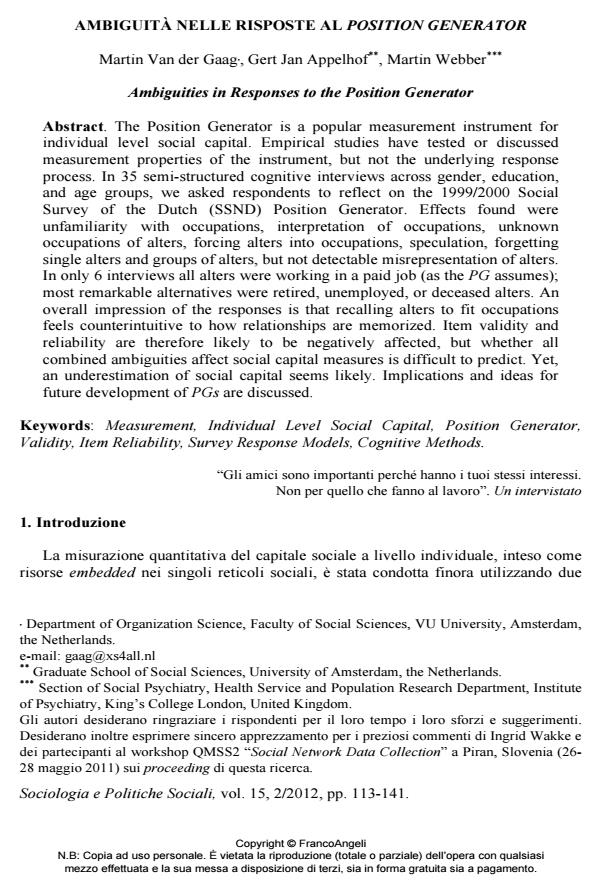Ambiguità nelle risposte al position generator
Journal title SOCIOLOGIA E POLITICHE SOCIALI
Author/s Martin Van der Gaag, Gert Jan Appelhof, Martin Webber
Publishing Year 2012 Issue 2012/2 Language Italian
Pages 29 P. 113-141 File size 577 KB
DOI 10.3280/SP2012-002006
DOI is like a bar code for intellectual property: to have more infomation
click here
Below, you can see the article first page
If you want to buy this article in PDF format, you can do it, following the instructions to buy download credits

FrancoAngeli is member of Publishers International Linking Association, Inc (PILA), a not-for-profit association which run the CrossRef service enabling links to and from online scholarly content.
The Position Generator is a popular measurement instrument for individual level social capital. Empirical studies have tested or discussed measurement properties of the instrument, but not the underlying response process. In 35 semi-structured cognitive interviews across gender, education, and age groups, we asked respondents to reflect on the 1999/2000 Social Survey of the Dutch (SSND) Position Generator. Effects found were unfamiliarity with occupations, interpretation of occupations, unknown occupations of alters, forcing alters into occupations, speculation, forgetting single alters and groups of alters, but not detectable misrepresentation of alters. In only 6 interviews all alters were working in a paid job (as the PG assumes); most remarkable alternatives were retired, unemployed, or deceased alters. An overall impression of the responses is that recalling alters to fit occupations feels counterintuitive to how relationships are memorized. Item validity and reliability are therefore likely to be negatively affected, but whether all combined ambiguities affect social capital measures is difficult to predict. Yet, an underestimation of social capital seems likely. Implications and ideas for future development of PGs are discussed.
Keywords: Measurement, Individual Level Social Capital, Position Generator, Validity, Item Reliability, Survey Response Models, Cognitive Methods.
- Mapping social milieus and cohesion patterns between 1997 and 2014. Exploiting the potential of the occupational position generator Zoltán Kmetty, Róbert Tardos, Fruzsina Albert, Beáta Dávid, in Social Networks /2018 pp.116
DOI: 10.1016/j.socnet.2018.05.007
Martin Van der Gaag, Gert Jan Appelhof, Martin Webber, Ambiguità nelle risposte al position generator in "SOCIOLOGIA E POLITICHE SOCIALI" 2/2012, pp 113-141, DOI: 10.3280/SP2012-002006